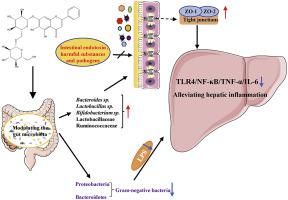代谢相关脂肪肝病(MAFLD)已成为一种常见的慢性肝病,但尚无 FDA 批准的治疗 MAFLD 的药物。大量研究表明,肠道菌群失调对 MAFLD 进展具有至关重要的影响。Oroxin B 是传统中药Oroxylum indicum (L.) Kurz 的成分。( O. indicum),具有口服生物利用度低但生物活性高的特点。然而,oroxin B 通过恢复肠道菌群平衡改善 MAFLD 的机制仍不清楚。为此,我们评估了 oroxin B 在 HFD 喂养大鼠中的抗 MAFLD 作用,并研究了其潜在机制。我们的结果表明,oroxin B 给药可降低血浆和肝脏中的脂质水平,并降低血浆中的脂多糖 (LPS)、白细胞介素 6 (IL-6) 和肿瘤坏死因子-α (TNF-α) 水平。此外,oroxin B 减轻了肝脏炎症和纤维化。从机制上讲,oroxin B 通过增加乳酸杆菌、葡萄球菌和真杆菌的水平来调节 HFD 喂养大鼠的肠道微生物群结构并降低Tomitella、Bilophila、Acetanaerobacterium和Faecalibaculum的水平。此外,oroxin B 不仅抑制 Toll 样受体 4 抑制剂 kappa B-核因子 kappa-B-白细胞介素 6/肿瘤坏死因子-α (TLR4-IκB–NF–κB-IL-6/TNF-α) 信号转导而且还通过提高 zonula occludens 1 (ZO-1) 和 zonula occludens 2 (ZO-2) 的表达来增强肠道屏障。总之,这些结果表明 oroxin B 可以通过调节肠道微生物群平衡和加强肠道屏障来缓解肝脏炎症和 MAFLD 进展。因此,我们的研究表明 oroxin B 是一种很有前途的 MAFLD 治疗有效化合物。
 "点击查看英文标题和摘要"
"点击查看英文标题和摘要"
Oroxin B improves metabolic-associated fatty liver disease by alleviating gut microbiota dysbiosis in a high-fat diet-induced rat model
Metabolic-associated fatty liver disease (MAFLD) has become a common chronic liver disease, but there is no FDA-approved drug for MAFLD treatment. Numerous studies have revealed that gut microbiota dysbiosis exerts a crucial effect on MAFLD progression. Oroxin B is a constituent of the traditional Chinese medicine Oroxylum indicum (L.) Kurz. (O. indicum), which has the characteristics of low oral bioavailability but high bioactivity. However, the mechanism through which oroxin B improves MAFLD by restoring the gut microbiota balance remains unclear. To this end, we assessed the anti-MAFLD effect of oroxin B in HFD-fed rats and investigated the underlying mechanism. Our results indicated that oroxin B administration reduced the lipid levels in the plasma and liver and lowered the lipopolysaccharide (LPS), interleukin 6 (IL-6), and tumor necrosis factor-α (TNF-α) levels in the plasma. Moreover, oroxin B alleviated hepatic inflammation and fibrosis. Mechanistically, oroxin B modulated the gut microbiota structure in HFD-fed rats by increasing the levels of Lactobacillus, Staphylococcus, and Eubacterium and decreasing the levels of Tomitella, Bilophila, Acetanaerobacterium, and Faecalibaculum. Furthermore, oroxin B not only suppressed Toll-like receptor 4-inhibitor kappa B-nuclear factor kappa-B-interleukin 6/tumor necrosis factor-α (TLR4-IκB–NF–κB-IL-6/TNF-α) signal transduction but also strengthened the intestinal barrier by elevating the expression of zonula occludens 1 (ZO-1) and zonula occludens 2 (ZO-2). In summary, these results demonstrate that oroxin B could alleviate hepatic inflammation and MAFLD progression by regulating the gut microbiota balance and strengthening the intestinal barrier. Hence, our study suggests that oroxin B is a promising effective compound for MAFLD treatment.
































 京公网安备 11010802027423号
京公网安备 11010802027423号